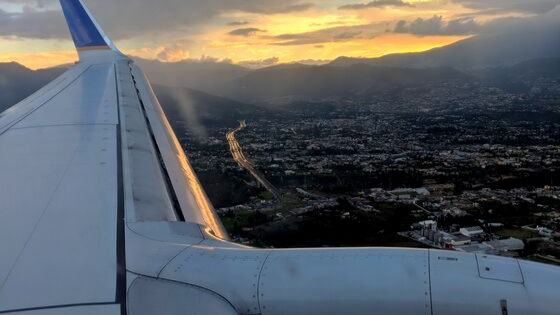You fly into Quito between clouds that are creeping over the mountains into the valleys below you.
Looking out the window, you’re tempted to parachute out the airplane emergency exit in that very moment just to start your adventure a little sooner. But, alas, you left your parachute at home.
After disembarking, driving into the city, soaking in the hills covered in brightly colored houses, and arriving at your lodging, the urge to pull on your hiking boots and climb up the nearest mountain might hit you.
However, this is a little bit of a no no for your first day or two in Quito. With an elevation of 2,850 meters (9,350 ft), altitude sickness is a nagging possibility.
Symptoms include: headache, nausea, dizziness, throwing up, feeling tired, shortness of breath, faster heart rate, not feeling well overall, trouble sleeping, and loss of appetite.
Fun fact: Here in Quito, this ailment is known as “soroche”.
This doesn’t mean you have to imprison your adventurous spirit, it’s just an opportunity to sit back, relax, and soak in what the city has to offer. With the proper precautions, you’ll be ready to conquer Quito in no time.
Here are 5 tips for Preventing Altitude Sickness:
#1 Drink Water
Staying hydrated is necessary as your body fights this oxygen deficiency. Coffee and alcohol won’t cut it–they’ll make the problem worse actually.
Instead, it’s best to drink H2O. As a new visitor to the city, we recommend that you drink bottled water or water that’s been filtered or boiled. Safely prepared fresh fruit juices are a delicious option. My favorite: Mora (blackberry)!
If you’re planning on some extensive hiking, studies have shown that your body will respond even better to sports drinks like Gatorade. It’s recommended that you daily drink 3-4L of water while at a high altitude!
#2 Eat Carbs
Yup, you read that correctly. Your prescribed remedy is a big bowl of rice perhaps with some Ecuadorian ceviche or some seco de pollo to go along with it. Eating carbohydrates helps your body fight the effects of altitude sickness for a couple different reasons.
Your body is going to need more energy to keep functioning normally. To do this, it might dip into the stores of energy in your muscle tissue (glycogen) unless it receives plenty of carbs to keep it satisfied.
Your body uses oxygen as it metabolizes food. Carbohydrates require less oxygen to break down than proteins or fats, so eating a diet high in potatoes, rice, quinoa, fruit, or bread will help out your body as you make this adjustment to a higher elevation. You’re in luck, when it comes to carbs, Quito has a lot to offer!
#3 Take Aspirin
Aspirin is an effective measure for reducing symptoms brought on by the altitude. This scientific study tested the difference between a placebo and aspirin in preventing headaches and nausea and other high-elevation side effects. Aspirin performed splendidly which confirmed its use as an anti-altitude sickness drug.
It’s easy to aquire this remedy right here in Quito. Bring your own along if you’d like, or stop at a pharmacy when you get here to pick some up. It’s reasonably priced and available over-the-counter.
#4 Take it Easy
Sometimes the best medicine is just some relaxation. Try to get a little extra sleep at night and don’t push it too hard through your first few days in Quito. You could spend the day relaxing at one of Quito’s many parks, people watching in el Centro Histórico, or enjoying an Ecuadorian film at Ochoymedio in la Floresta.
#5 Try Altitude Sickness Meds
If you’re worried about feeling yucky because of this change in altitude, it’s a good idea to talk to your doctor before traveling to Quito, and they can prescribe you medication that can help prevent altitude sickness. Acetazolamide is one of these drugs. If it is taken two days before your trip, there’s evidence that it can keep you feeling fine even with the change in elevation.
Don’t fret. With these simple guidelines, you’re on track for fighting off the negative effects of Quito’s altitude. While at first you might walk up a hill and feel like you’ve just sprinted a mile, you will adjust within a few days. Your body is pretty cool that way. Plus, when you return to more oxygen-saturated air, you’re going to feel like a superhero.
You never know, though, you might just love Quito so much–thin air and all–that you might not want to leave…ever.




